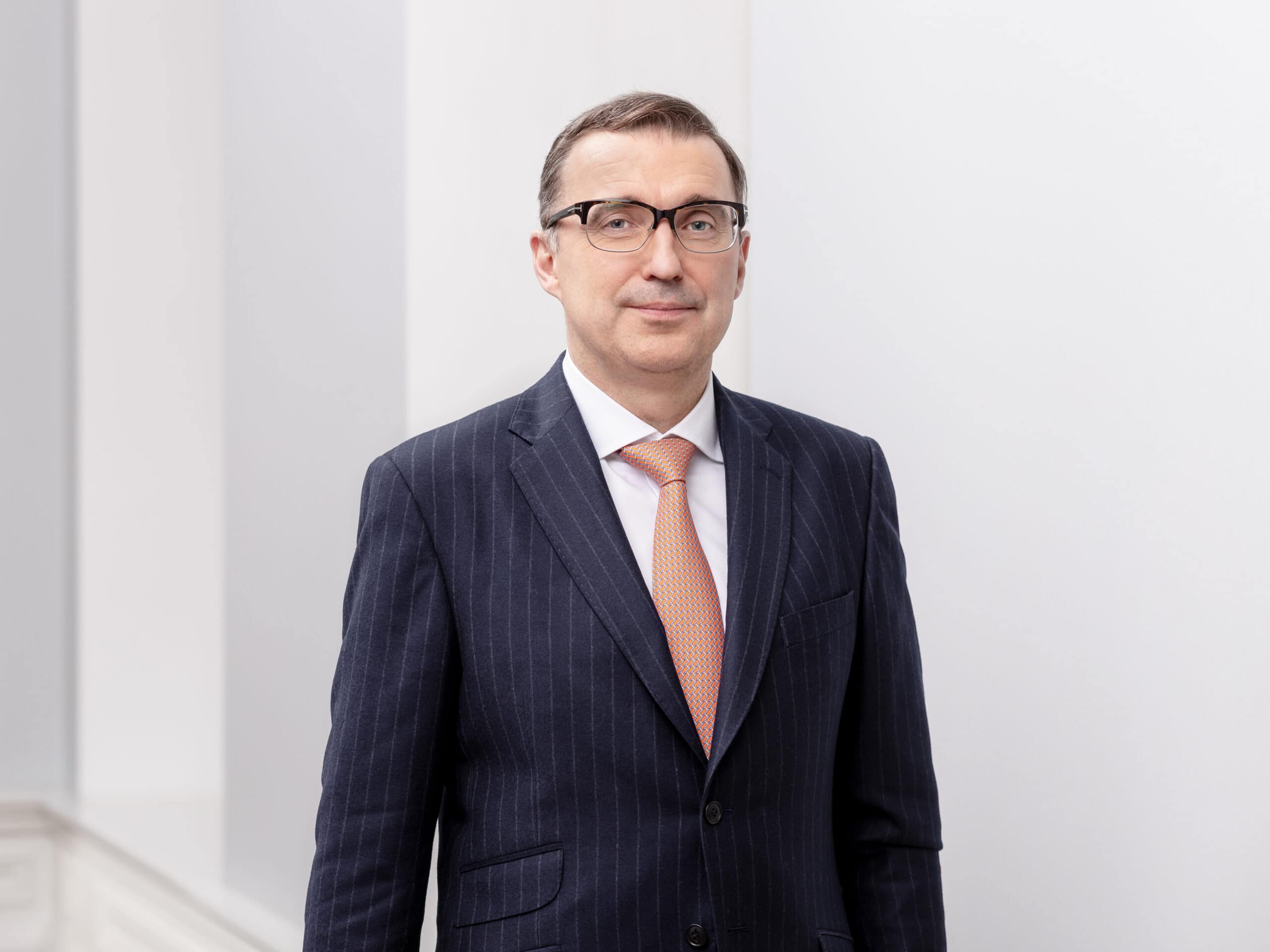In this interview, former Estonian IT minister Andres Sutt explains how Estonia became the country with the best digital services, how the war raised awareness for dual-use technologies, and how the government experiments to cut red tape.

Member of Parliament, Estonia
Andres Sutt is a member of parliament and a former minister of entrepreneurship and IT in Estonia. As a Minister, he oversaw the development of the e-Estonia ecosystem, raised investments in cyber security, and launched the 5G rollout. He promoted the Estonian startup ecosystem and collaboration in innovation between businesses and universities.
Before entering politics, he was a board member at renewable energy company Enefit, Head of Banking at the European Stability Mechanism in Luxembourg, Senior Advisor to and member of the IMF Executive Board, and Deputy Governor responsible for financial stability at the Estonian National Bank. He has a master’s degree in economics and finance from Tartu University and an continued studies from INSEAD.
Estonia is a small country, but its startup scene is impressive. How come?
It all started with Skype, which was launched in 2003 and acquired by Microsoft in 2011 for USD 8.5 billion. International phone calls were still costly back then, and Skype challenged this status quo. We see the same dynamic with another success story from Estonia, Wise, which attacked the traditional banks charging too much for cross-border transactions. Every large exit is a boon for the startup ecosystem, as many employees walk away with a few million and are ready to create or invest in the next promising startup. The size of a country does not matter; the ambition of its people does. Many young entrepreneurs in Estonia want to solve a global problem. They must think big, as the domestic market with 1.3 million inhabitants is too small.
The startup movement is something our society needs. Startups exist for a reason: they fill a space left empty by old companies that, burdened by their legacy, cannot keep pace with technological developments. One startup alone doesn’t account for much, but together with others, it becomes a powerful force as an ecosystem.
Estonia has a frontier of 300 kilometers with Russia. How has the Russo-Ukrainian War affected the startup scene?
Many Estonian founders have championed support projects for Ukraine. To name but one, Ragnar Sass, the co-founder of the unicorn Pipedrive, has organized SUVs for the Ukrainian military. On a bigger scale, the war in Ukraine has significantly changed the dynamics of modern warfare. Drones have become essential on the battlefield, and interest in dual-use technologies has increased. One example is the Tallinn-based startup Milrem Robotics. Its unmanned ground vehicle was introduced in 2015, but the war has boosted demand for its military version. Another example, though not a startup, is Baltic Workboats, located on one of Estonia’s islands. It used to be a shipyard and still is, but it has transformed into a tech company developing high-tech vessels. The European Defence Fund has contributed around two-thirds of a EUR 95 million budget to establish a new semi-autonomous naval platform to strengthen the continent’s sea defense capabilities. Baltic Workboats is leading a consortium of 23 companies from different countries. Finally, the Estonian government has agreed to establish a EUR 50 million fund to invest in companies that develop innovative defense or dual-use technologies.
Some European countries have vocal opposition to the state investing in military innovation.
There was no need to convince the population that this was the right decision. We have also increased our defense budget from 2% of GDP to 3.4%. No one questioned it.
Let’s step back from current affairs. The “Principles of Estonian Information Policy” were established thirty years ago. The document shaped the country’s IT policy after its independence in 1991. As a result, 1% of GDP was earmarked as state funding for IT. It was the basis for the state’s digital services for its citizens. How was it made possible?
It is like the startup ecosystem: one element alone is not a game-changer, but the sum of the elements is. In the early days, establishing digital services was necessary because we had little to spend. The timing was right, as the internet was on the rise and personal computers started to become more commonplace. We seized the moment. If you ask me what the most crucial piece of the puzzle was, it was introducing the unique personal identification code and mandatory ID card for every citizen. At first it enabled the digital signature, later further services were added, allowing to connect to digital identification systems like Smart-ID or Mobile-ID to log into e-government services entirely digitally. People would freak out about this in many countries because of privacy concerns.
For a good reason or not?
A digital system is better at guaranteeing your privacy than paper. If someone copies a paper document, there is no trace, and you will never know. Our system incorporates digital footprints. Citizens can see which digital information was accessed, when, and by whom.

Invest in Startups
As one of Europe’s most active venture capital investors, we grant qualified private investors access to top-tier European startups. With investments starting at EUR/CHF 10’000, you can build your own tailored portfolio over time and diversify across stages and sectors.
You mentioned that establishing a digital backbone of society in other countries might face opposition. How did politicians convince the Estonian population?
People did not need convincing; they chose it. They said, “If it makes life easier, let’s do it.” It was also a different time back then; privacy concerns have become more pronounced. It’s also not like there is no criticism. We’re constantly working on improving the user experience and interface. But our digital services are accessible 24/7. Who wants to stand in line to get a document? Paying your taxes in Estonia takes a few minutes. The record for establishing a new company was 18 minutes. This ease fosters acceptance, and it is also the reason why more and more people across the world opt for an Estonian E-residency.
E-residency has been available for a decade now. There are more than 100,000 e-residents worldwide. They have established more than 30,000 new businesses, and the tax revenue from them exceeds a quarter billion. It’s a clever way to monetize your digital infrastructure.
The money is significant, but it is about more than that. Estonia’s e-residency is integral to its brand as a modern and entrepreneurial country. The attraction for e-residents is that they do not need to be present in Estonia. They can start a company with access to the EU market without hassle. They can sign contracts digitally. It’s user-friendly. The numbers speak for themselves.
In many countries, regulation strangles business. Politicians usually respond to any problem by enacting even more legislation. Estonia, however, has established a governmental innovation lab called Accelerate Estonia that aims to tear down superfluous legislation. Its website says, “If you could change any law to enable an innovative business idea, what would it be?” That sounds nice, but has it proven to have a measurable impact?
Accelerate Estonia breathes the same spirit as our digital society. Estonia is no exception to the rule that legislation is becoming more detailed and touching more and more fields of life. This is a threat to innovation. Good ideas fail to materialize because laws block them. This is why we created this platform. It connects businesses and startups with the right people in different government agencies so that they can find a solution that works.
There are promising first examples. One initiative aims to establish automated self-service pharmacies that sell over-the-counter medicines and are open 24/7. Customers still have access to professional advice through a video call. The incumbents are resistant to this project, but people really appreciate it. These pharmacies can be located in places people pass by frequently or in rural areas where there was no pharmacy before.
Another initiative aims to simplify the approval process for novel food products. This is a very lengthy and costly process in the EU today. We need to speed it up otherwise innovative startups will just take their business elsewhere. At the same time, we need to ensure that the approval process is stringent and ensures food safety.
It is important to note that Accelerate Estonia is a regulatory sandbox. Changing laws still requires the normal parliamentary process, but governments must experiment to better serve their citizens.
Written by
WITH US, YOU CANCO-INVEST IN DEEP TECH STARTUPS

Verve's investor network
With annual investments of EUR 60-70 mio, we belong to the top 10% most active startup investors in Europe. We therefore get you into competitive financing rounds alongside other world-class venture capital funds.
We empower you to build your individual portfolio.
More News
05.07.2024
“European VCs must make hard decisions faster“
In this interview, Jon Roberts, co-founder of Menalto Advisors, explains how founders can increase their odds of success and why European venture capital firms should stop financing zombie companies.
01.02.2024
“There needs to be an older generation of entrepreneurs that supports the next”
More than two decades ago, Markus Schulte and his Co-founder built a startup straight out of ETH Zurich, developed it into the market leader and successfully sold it. Today, in addition to his role as the CEO of Olmero he is an active investor in venture capital and private equity and advises the Constructive Venture Fund.
Startups,Innovation andVenture Capital
Sign up to receive our weekly newsletter and learn about investing in technologies that are changing the world.



